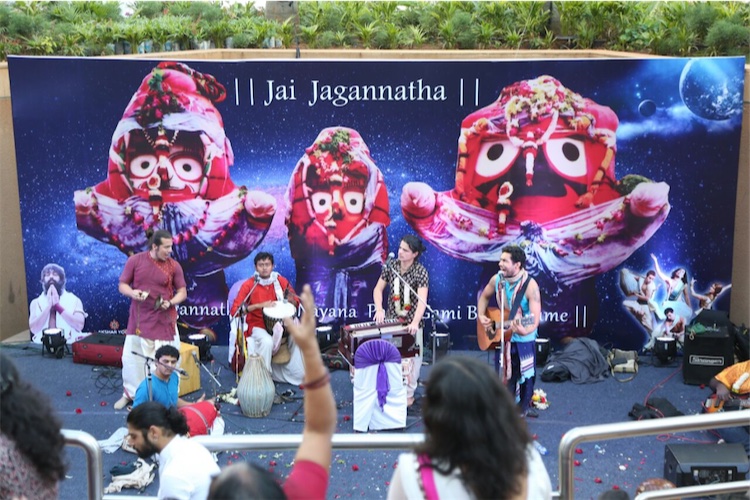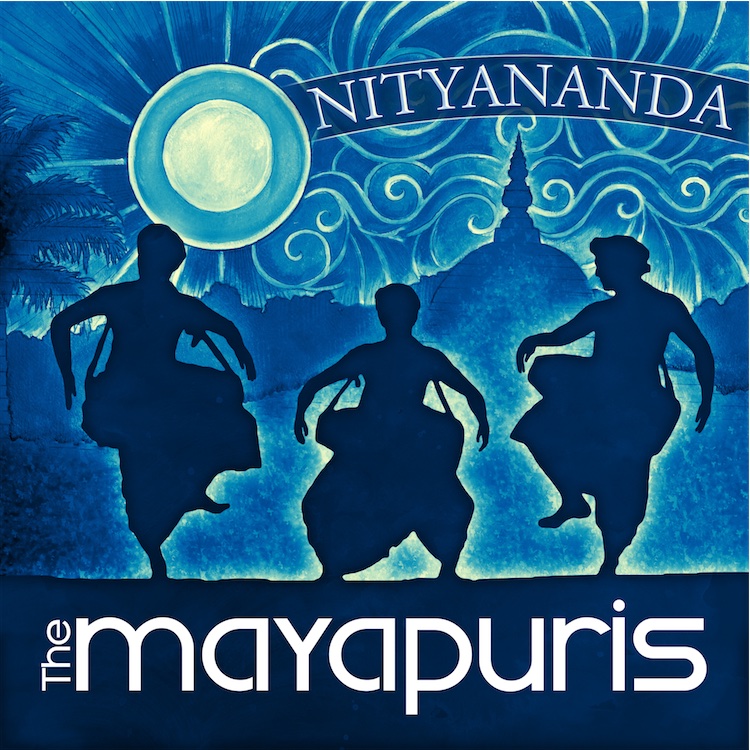Mayapuris’ New Album To Have Intriguing Concept
By Madhava Smullen | Мар 10, 2017

It’s been seven long years since kirtan band The Mayapuris released their debut album “Mridanga,” hitting the top five in the iTunes World Music chart.
The Mayapuris were one of the original second generation ISKCON groups to bring Gaudiya Vaishnava kirtan to the forefront of the burgeoning mainstream kirtan scene.
Since their debut, others have continued to forge the path, with Madi Das and his Bhakti Without Borders charity album winning a Grammy nomination.
Inspired by Madi’s achievement, the Mayapuris hope that with their second album, they can bring kirtan further into the mainstream, to places it hasn’t been before.

Hundreds of people chant the holy names during a concert for Bangalore’s Akshar Yoga
Their new album, expected Fall 2017, will be entitled “Nine Islands”—an English translation of the name of the sacred village “Navadvipa”—and will feature an intriguing concept.
There will be nine tracks, representing the nine processes of devotional service. Each track will be Gaudiya Vaishnava kirtan flavored with a different genre of music.
“Traditional kirtan is our favorite, and closest to our heart,” says Krishna Kishor Rico, who is in the band with his brother Balarama Tirtha and friend Visvambhar Sheth. “But we really want to make a nice presentation so that people from different walks of life, and with different tastes in music, can appreciate the Holy Name. And in that way, we hope to open doors.”
A single, “Nityananda,” will precede the album and is set for release on April 7th on iTunes, Amazon, Spotify and Google Play.
Derived from Sarvabhauma Bhattacharya’s “Sri Nityananda Candrasya Nam Dvadasakam,” it invokes twelve names of Nityananda Prabhu and has a Western classical music flavor.

The Mayapuris perform at Akshar Yoga in Bangalore
“These twelve names of Lord Nityananda really attracted my heart,” says Krishna Kishor. “What Sarvabhauma Bhattacharya says about them is beautiful. He writes that if you chant these twelve names upon rising every day, you’ll be free from mental anxieties.”
Originally planned as a three-minute track, “Nityananda” has swelled to a nearly seven-minute epic. Starting slowly and blending traditional kirtan instruments with violin, bass and Jaya Sita Dasi’s achingly beautiful cello, it has a sweeping cinematic feel and builds to a rollicking mridanga-filled crescendo.
Other songs on the album will be influenced by Bengali folk, reggae, alternative rock, hip-hop, Qawwali, Indian classical, and pop.
One song will invoke the names of Srimati Radharani. The reggae track will be a Sita Rama bhajan. And the Qawwali number will be Narottama Das Thakur’s “Hari Hari Biphale” set to a melody inspired by Nusrat Fateh Ali Khan.
Diversifying even further, “Nine Islands” will feature a song with entirely English lyrics. Written by Dhanya, Balarama Tirtha’s wife and the daughter of Latin-Grammy winner Havi Das (Ilan Chester), it’s a heartfelt piece entitled “Gurudeva.”

The cover of the Mayapuris’ April 7th single ‘Nityananda’
Meanwhile on the hip-hop flavored “Sri Krishna Sharanam Mama,” Balarama-Tirtha will break out his formidable rapping skills, accompanied by a trap drum-set.
The Mayapuris are currently working on the album—which will be self-produced and crowdfunded—at their home studio in Alachua, Florida. A European tour and a visit to India is likely to follow in 2018, after the album’s release.
The group is also gearing up to create buzz through a video teaser and a grassroots social media campaign with the contacts they’ve built up internationally over years of touring.
But despite the music industry techniques they’re using, the Mayapuris’ ultimate goal is to spread the Holy Name far and wide, and to focus on kirtan’s true essence and purpose.
“Bhaktisiddhanta Sarasvati Thakur said, ‘Don’t judge others – rectify yourself,’” says Kish. “So if we focus on rectifying ourselves, maintaining good sadhana, and trying our best to sincerely chant the Holy Name, we will really make an impact and be able to share the intention of the music.”
It all ties back to the theme of the album. “We’re calling it Nine Islands, which signifies the nine processes of devotional service,” says Krishna Kishor. “So we’re meditating on the idea that if we can just focus on these nine processes of devotional service for ourselves, and then share them with others, that is the perfection of life.”















